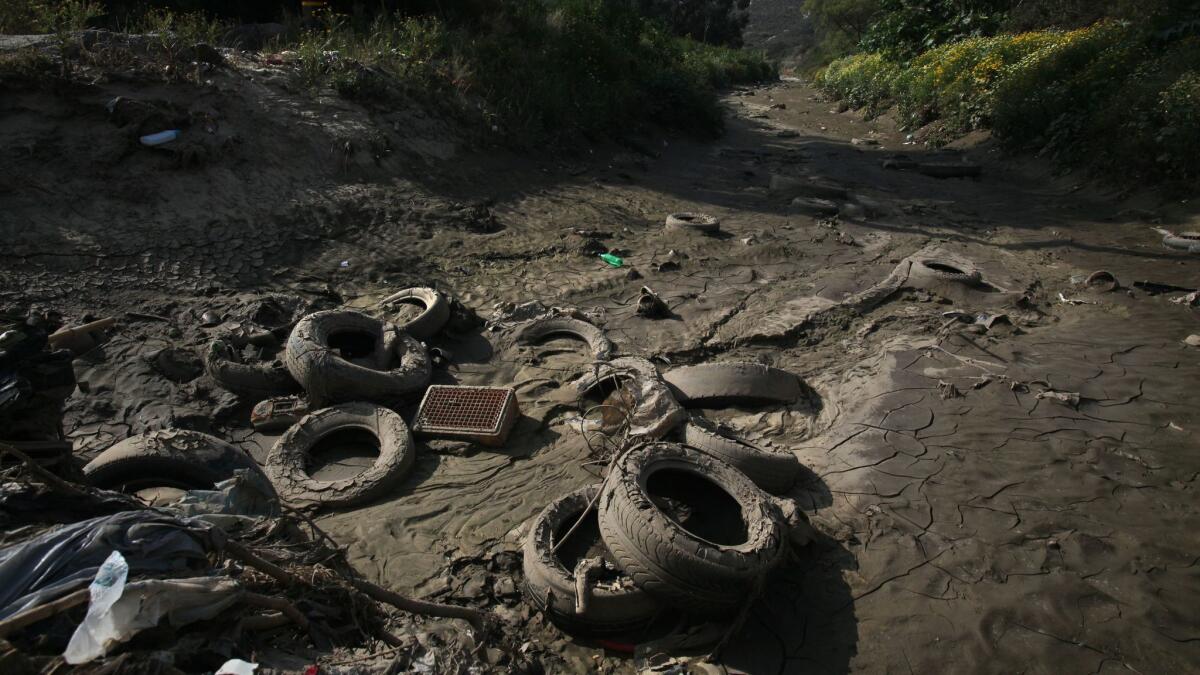Imperial Beach poised to sue the federal government over border pollution

- Share via
San Diego — Officials in Imperial Beach this week announced they were preparing to take legal action against the federal government concerning the continued flow of polluted wastewater from Tijuana into San Diego County.
The city is targeting the U.S. section of the International Boundary and Water Commission, a binational agency that oversees water treaties between the U.S. and Mexico. Imperial Beach officials allege that the agency repeatedly has failed to properly capture and treat sewage routinely flowing across the border through canyons and the Tijuana River.
“We’re hoping to force the U.S. government to address this issue and spend the money needed to stop the flow of toxic waste and sewage into the Tijuana River and under the border fence,” said Imperial Beach Mayor Serge Dedina, who also heads the environmental group Wildcoast.
Officials with the U.S. section of the boundary and water commission denied allegations that they haven’t taken proper steps to safeguard the region’s water quality.
“It’s important to acknowledge that we have taken and continue to take concrete actions to address conditions at the U.S.-Mexico border,” said Sally Spener, spokeswoman for the panel. “We’ve been very responsive to the city of Imperial Beach and have taken concrete actions on some of their recommendations and the recommendations of other stakeholders. That includes studying infrastructure alternatives on the U.S. side.”
Imperial Beach has retained an outside law firm to prepare a 60-day notice that is required before it can sue the federal government for the alleged violations of the U.S. Clean Water Act.
The legal team is also representing the city in a potentially groundbreaking lawsuit against the world’s largest oil and coal companies for the local financial impacts of sea-level rise.
Long-held frustrations came to a head in February, after millions of gallons of sewage poured into the Tijuana River south of the border and fouled beaches as far north as Coronado.
A binational investigation found that as much as 256 million gallons of raw sewage and wastewater went unaccounted for as a result of heavy rains that overwhelmed Tijuana’s sewer system, cracking pipes that spilled directly into the river. It was the latest flashpoint for the cross-border water pollution issue, which has persisted for decades despite financial investments by Mexico and the U.S. to make various infrastructure improvements.
U.S. Border Patrol agents who work in the region have come out in support of the legal action by Imperial Beach.
Officials with National Border Patrol Council Local 1613 have said they’re considering filing their own lawsuit against the federal government to highlight what they said are hazardous work conditions.
In recent months, the local union has expressed concerns about respiratory problems, rashes and nausea that it said are linked to cross-border spills. While such unanticipated flows don’t necessarily make it into the Tijuana River or open waters, they have regularly poured through culverts and canyons, according to records from the boundary and water commission.
Besides the accusations from the Border Patrol union, the agency’s agents have filed dozens of reports documenting adverse reactions after they came into contact with the potentially hazardous sewage flows, including chemical burns, rashes, respiratory infections and breathing problems. Agents routinely track down illegal border crossers through mud contaminated with sewage, officials said.
joshua.smith@sduniontribune.com
Smith writes for the San Diego Union-Tribune
More to Read
Sign up for Essential California
The most important California stories and recommendations in your inbox every morning.
You may occasionally receive promotional content from the Los Angeles Times.














